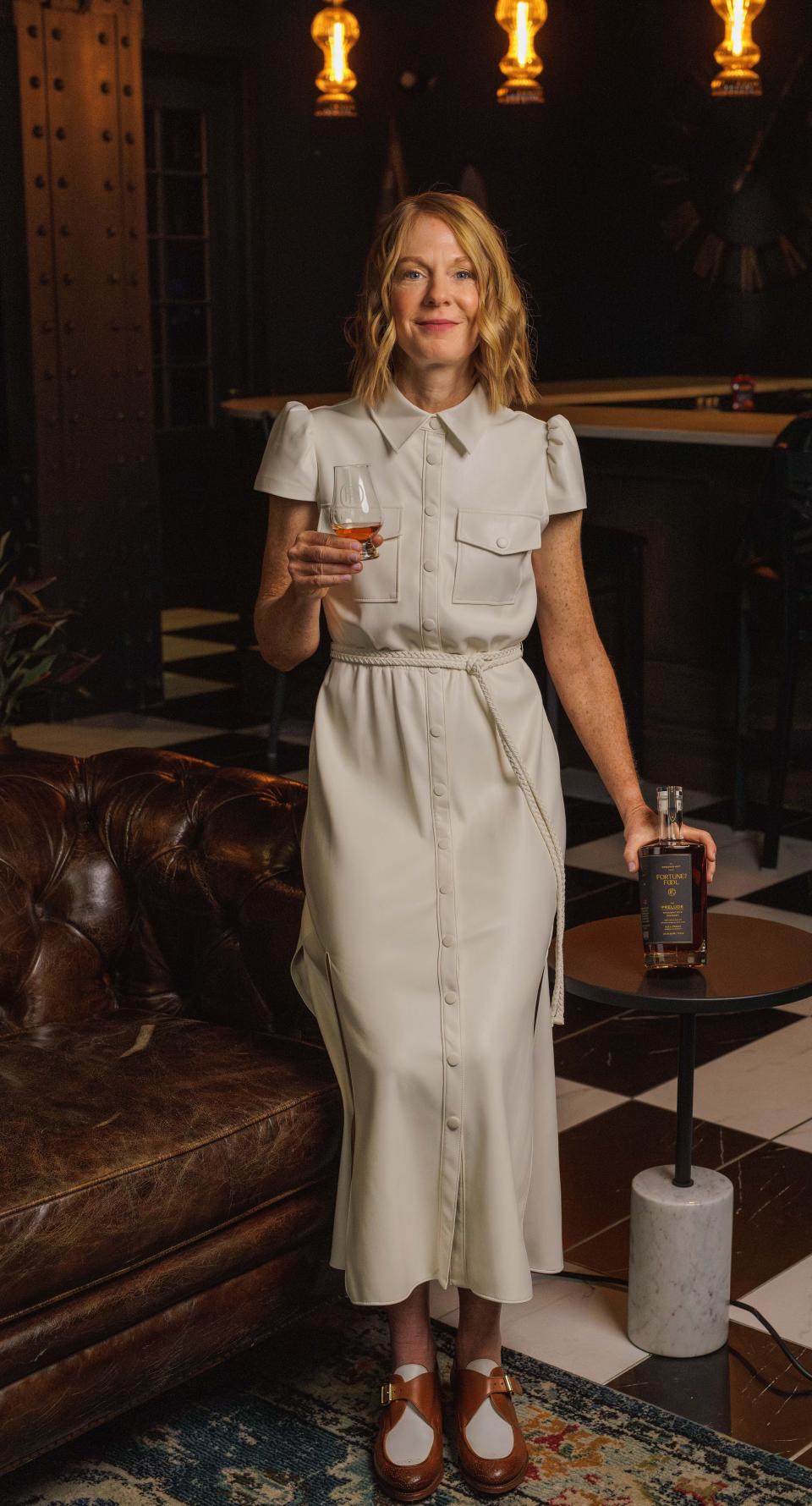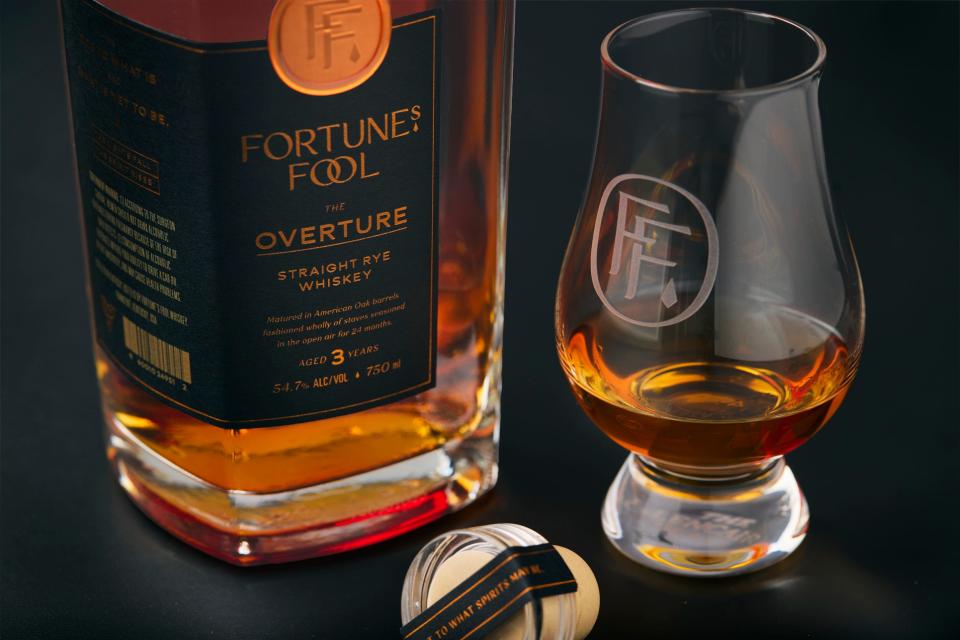Meet the Indianapolis woman bringing the whiskey craze to the Hoosier state
It seems like everyone has their own liquor line these days. Bourbon by Peyton Manning, tequila from The Rock, skull-shaped vodka courtesy of a former Ghostbuster — no, not Bill Murray; he’s a spokesperson for a different vodka brand.
The deluge of spirit start-ups in the last decade is enough to make your head spin. Who’s next, your physician?
Well, in the case of Juliet Schmalz, yes. Schmalz, a 50-year-old former anesthesiologist from Indianapolis, co-founded Fortune’s Fool whiskey in 2019, entering a crowded industry in which women comprise less than 10% of distillers.
For years, Schmalz floated around the “outskirts of medicine,” working in fields like acupuncture. She itched to try something new, but struggled with the idea of striking out on her own.
“I could never take that leap,” Schmalz said. “Starting a business terrified me.”
Then she met her husband, Steve Sorel, in 2017. Sorel is an Indianapolis businessman, no stranger to fundraising and venture capital. As the pair’s relationship grew more serious, Sorel asked Schmalz where she wanted to take her career.
“And I wanted to create whiskey,” she said.

Schmalz began developing her taste for whiskey as a 21-year-old at Indiana University, where she studied biology and rode for the now-defunct, then-dominant Landsharks Little 500 team. Her drink of choice was Maker’s Mark and Diet Coke. Eventually, she upgraded the whiskey and started ordering it neat — often with a curious glance from the bartender.
In 2018, she used vacation time from her anesthesiologist job to attend Moonshine University in bourbon-crazed Louisville, where she took various crash courses on whiskey production. In 2023, Fortune’s Fool made its debut with The Prelude, a 32-month-aged straight rye whiskey with notes of fruit and butterscotch.
To get in front of more drinkers, Schmalz held public tastings and sent bottles of The Prelude to influential people in the spirits industry. One of them was Nick Beiter, co-founder of whiskey-centric publication Breaking Bourbon. Beiter has been reviewing whiskeys for over a decade; he estimates he samples around 300 new ones each year.
“I probably have about a thousand open bottles at home,” he said.
While young whiskeys like The Prelude tend to have harsher flavors than those that have spent a decade or more soaking up rich, complex notes from their barrels, Beiter commended The Prelude’s surprising depth of flavor, not as youthful or grain-forward as most similarly aged batches.
“That’s really well developed for what that is,” Beiter said.
Beiter said it may take years of testing and tinkering for Schmalz’ brand to fully realize its potential, as is the case with any young brand. For now, though, Fortune’s Fool “looks like it’s going in the right direction.”
“They call it ‘Prelude’ for a reason,” Beiter said. “I think it’s, ‘Hey, here’s a taste of what’s to come.’”
Fortune’s Fool’s theatrical motif comes from Schmalz’ first name, which she shares with the heroine of William Shakespeare’s famed tragedy. Romeo declares, “I am fortune’s fool,” after killing his rival, Tybalt, in Act 3 of “Romeo and Juliet.”
Schmalz admits she doesn’t have any deep personal ties to Shakespeare’s work. She’s read “Romeo and Juliet” twice, once in high school and again after settling on Fortune’s Fool’s name. Earlier in the branding process, one of Schmalz’ marketing partners pitched just “Juliet.”
“I’m like, no, no, no,” Schmalz said.
Naming her company after herself was a bridge too far for Schmalz, who felt far more at home in hospitals, briefly chatting with patients for five minutes or so before the anesthesia kicked in.
In medicine, Schmalz was always risk-averse. Starting a business, meanwhile, is mostly risk. So Schmalz and her team obsess over what they can control, from the grains they ferment to the wood in their barrels. Fortune’s Fool uses barrels from Napa, California cooperage Seguin Moreau, which leaves American oak staves outside in the elements for two years so precipitation can wash away bitter tannins in the wood.
The wood is then dried in a kiln and roughly shaped into a barrel. Seguin Moreau’s coopers char the barrels over an oak chip fire, amplifying the subtle flavors in the wood and relaxing the staves so a cooper can affix metal rings around them and give the barrel its characteristic rotund shape.
“Each individual barrel tastes different than the other,” Schmalz said. “It’s like an art and science in and of itself.”

Finally, the whiskey, which Schmalz spends about a month testing and tweaking with a Kentucky distillery, goes in the barrels to age. Fortune’s Fool’s most recent batch, The Overture, aged for 39 months. A well-versed whiskey aficionado will pick up hints of vanilla, citrus and baking spices beneath the alcoholic heat. Less experienced drinkers are encouraged to sip cautiously or mix in a cocktail — straight 109.4-proof rye whiskey is a bit of a jump from Maker’s Mark and Diet Coke.
At $60 per bottle, Fortune’s Fool may not strike whiskey novices as an entry-level spirit, but Schmalz hopes outsiders will take a chance on it. She’s seen the height of whiskey culture in Kentucky and believes there’s room for it in neighboring Indiana.
“We too can drink that way, we too can produce that way,” she said. “Let’s take some of that ownership. We’re right here.”
Contact IndyStar dining and drinks reporter Bradley Hohulin at bhohulin@indystar.com. You can follow him on Twitter/X @BradleyHohulin.
This article originally appeared on Indianapolis Star: A whiskey boom in Indiana? Meet the woman trying to make it happen.

